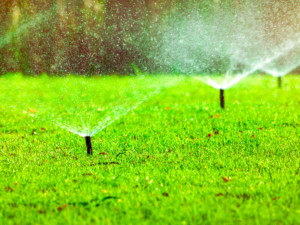
Sprinkler Fault Locators: Acoustic vs. Electronic – Choosing the Right Tool for the Job
Tips from Lawn Sense – Lawn Sense means no-nonsense.
Let’s talk sprinkler fault locators. If you’ve ever stood over a soggy patch of grass wondering where all that water’s leaking from, you’re not alone. Locating Sprinkler leaks can feel like playing hide-and-seek with a puddle. The water’s showing up on your lawn, but the source? Not so obvious. That’s where fault locators come in—and trust us, not all are created equal.
Over the years, we’ve used acoustic and electronic leak detectors, each with its strengths. Choosing the right one isn’t guesswork—it requires knowing your land, your system, and what kind of trouble you’re tracking.
Acoustic Leak Detectors: Listening for Trouble
Think of acoustic leak detectors like a stethoscope for your yard. These devices amplify the sound of water escaping under pressure. If a pipe’s cracked or a sprinkler joint leaks underground, it usually makes a hissing, bubbling, or splashing sound—faint, but there.
With headphones on, we’ve crouched on many lawns, slowly moving the sensor across the surface like a prospector listening for gold. And let me tell you—it works, especially in quiet neighborhoods or early mornings before the world wakes up.
Pros:
- Great for pinpointing pressurized leaks
- Doesn’t need direct contact with water
- Works well on turf, soil, or mulch
Cons:
- Background noise can mess with accuracy
- Harder to use in high-traffic or windy areas
- Learning curve involved—you can’t just plug and go
Still, if you’ve got a good ear (or just let us handle it), these devices do a solid job of locating buried trouble without tearing up your yard first.
Electronic Leak Locators: Follow the Signal
Electronic fault locators use electromagnetic signals. We attach a transmitter to your irrigation line and then use a receiver to trace the path of the signal. It’s kind of like following a breadcrumb trail made of beeps and pulses. If the signal gets weird—weakens, changes pitch, or cuts out—we know there’s a break or leak nearby.
These are especially helpful with longer pipe runs or complex systems. They don’t just tell you something’s wrong—they tell you where in the line the problem starts.
Pros:
- Great for tracing wire and pipe paths
- Can detect faults in both metal and non-metal pipes
- More resistant to interference than acoustic tools
Cons:
- Requires good grounding and line access
- Less effective on shallow or low-pressure leaks
- Not ideal in places with lots of underground utilities
We often use these on properties with a maze of zones or deeply buried pipes. If you have a big backyard or an older system without clear plans, this tool is your best friend.
So, Which One Do We Use?
Honestly? Both. We don’t play favorites—we play smart.
If we suspect a shallow, noisy leak, we start with acoustics. If the problem goes deeper or the lines twist and turn through the property, we bring in the electronic locator. Sometimes, the job requires both tools working together. That’s why we don’t show up with just one gadget and a flashlight.
Remember, Lawn Sense means no-nonsense. We come ready to find the leak without digging up half your landscape guessing.
Real Talk: One Leak, Two Stories
Last summer, we worked with a family whose backyard was slowly turning into a pond. Their grass was beautiful, but parts were getting mushy and dying fast.
We tried acoustic first. The leak was whispering, but we couldn’t lock it down. So we pulled out the electronic gear and traced the line. Found a drop in signal under a flagstone path. Dug it up—sure enough, the pipe had cracked. One quick fix later, their yard dried up, the grass bounced back, and they were no longer watering their hardscape.
That’s the kind of thing we deal with daily. It’s why we keep both tools in the truck.
FAQ: Sprinkler Fault Locators
Which type of sprinkler fault locators or leak detectors is more accurate?
It depends on the situation. Acoustics are better for shallow, high-pressure leaks, while electronics work best for tracing lines and finding breaks in long or buried zones. We usually use both.
Can I use either type on my own?
Sure, you can buy the tools—but without training, it’s easy to misread the signals or miss the leak. Most homeowners find it’s faster and cheaper to call us in.
How long does leak detection take?
Most yards take us under an hour to inspect. Large or complicated systems may take longer, especially if multiple zones are affected.
Will this work if the leak is small?
Yep. We’ve found pinhole leaks with the right tools. The smaller the leak, the trickier it can be—but we’re used to playing detective.
What if I don’t hear or see anything obvious?
That’s the point of using these tools. They help us find leaks even when the signs of a leak are subtle or buried. If your water bill spikes or your grass is acting weird, it’s worth checking out.
Ready to Track That Leak?
Leaks won’t fix themselves. And if left alone, they’ll quietly chew through your yard and wallet.
We don’t believe in guesswork and are not here to play around with hoses and hopes. We use the right sprinkler fault locators for the job, which means solving the problem without ripping up your lawn like a treasure hunt gone wrong.
Give us a shout, and we’ll get to work with ears open and meters ready. With us, it’s simple: Lawn Sense means no-nonsense.